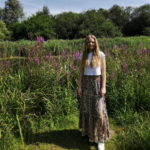
Conserving for the Future: An interview with Tomos Avent
Tomos is the Head of International Programmes at the Wildfowl and Wetlands Trust (WWT), an international conservation charity based in the UK. Read on to discover Tomos’ motivations for conserving nature, the benefit of understanding your own skillset, and the future of conservation.
What led you to your current position at WWT?
I studied Biology at the University of Exeter, specialising in ecology, then spent a year supporting the University of Edinburgh’s long-term studies on red deer and Soay sheep in the Hebridean Islands, which involved remote fieldwork in truly breath-taking places.
Talking to academics on the projects, I realised that I probably wasn’t a pure ecologist. I was more interested in the detective element of investigating conservation problems, and thinking about potential pathways to species and habitat recovery. I searched for some training to give me a solid foundation in this, and went on to complete an MSc at Imperial College London in Conservation Science.
After my Masters I felt I needed to gain experience abroad, and was lucky enough to find a job in South Africa for a fledgling NGO being set up to provide conservation advice for nature reserves. Funded by international students who joined for practical conservation experience and accredited training, we had a great business model that enabled a rapid growth of our impact in South Africa, Mozambique and Botswana.
What started for me as a bit of an opportunity for adventure and learning, ended up helping me to understand my strengths and weaknesses, many of which I probably wouldn’t have predicted before I started the job.
When I saw the Wildfowl and Wetlands Trust (WWT) had created a new role as Head of Conservation & Development for their growing international projects in developing countries, I was excited to see the evolution of an organisation that I had often visited as a child at Slimbridge Wetland Centre. In 2019 I became WWT’s Head of International Programmes, giving me a much broader mandate to help develop the direction of travel for our work.

Sarus cranes – WWT use this iconic species as a flagship for conserving the wetlands of the Mekong Delta © Copyright 2019 WWT.
What were your drivers for getting into conservation?
For me it was that problem-solving element that most interested me. I was always interested in the links and co-dependencies between people and natural systems, and as a child, I was rather naively confused as to why nature was so often disregarded in decision-making.
When I studied conservation, I enjoyed reviewing projects that had really interrogated the drivers for the destruction of nature, and explored potential, and often very creative, solutions in a strategic way.
I once read that conservation isn’t rocket science, it’s far more complex. You can build a rocket to a plan. Design one and you can make a whole lot more of the same. In conservation, unfortunately you can’t just copy and paste. You really have to take time to understand the context, engage with people, and co-design solutions.

Local community tree nursery for a lake catchment reforestation programme in Madagascar © Copyright 2019 WWT.
Do you have any advice for early-career conservationists?
Acknowledge the complexities and allow your worldview to evolve as you learn more. Working in conservation changes my perspective every day. I have learnt that strategic planning tools, like Open Standards for Conservation, are a great way to bring stakeholders together and test assumptions. It’s not rare to have preconceived ideas based on assumptions that might have missed the mark somehow.
Listening to stakeholders, and getting real buy-in for conservation plans is essential. You have to keep challenging yourself and put yourself in other peoples’ positions. It’s hard to secure resources for conservation work, so spending time for good planning and monitoring and evaluation systems is always worth the investment.
“You have to keep challenging yourself and put yourself in other peoples’ positions.”

Anlung Pring Wetland, Cambodia – a key WWT conservation site in the Mekong Delta © Copyright 2019 WWT.
What should early-career conservationists be focusing on?
In the current situation that we find ourselves in, how are we going to make space for nature within the evolving world? This is made even more significant by the changing climate; we need to stop thinking that we have to conserve nature as we have it for now, and realise that we’re living in a rapidly changing world and that we need to ensure nature is resilient for the changes it is going to face.
We need our conservationists to be thinking about the future and resilience. What are the future challenges, how do we address them, how can we fund nature conservation and restoration at scale, and how do we as a sector bring in the right skills?
There are more and more opportunities in areas like natural capital and environmental finance. It’s a growing field, and having a good foundation of knowledge in these areas is increasingly important as a lot of conservation work will be funded this way in the future.
“We need our conservationists to be thinking about the future and resilience.”
Finally, try to find what motivates you, evaluate your strengths, and think about the areas you need to develop in order to have an impact. When I went to the Hebrides I realised I didn’t have the mathematical brain for the population ecology projects I was working on, but I was good working with people and enjoyed trying to synthesise complex problems. I realised that those were my skills and interests and I needed to work with them.
Find what you can contribute and what impact you can make. At the end of the week you should think about what you’ve achieved and whether you’ve done as well as you could have; if you find what you’re good at, you’ll probably be able to more honestly answer that question in a positive light.
“Find what you can contribute and what impact you can make.”
What is the best part of your job?
Seeing capacity that is developing around some of WWT’s country offices and projects overseas. For example, it gives me great pride to see our Malagasy team in Madagascar become the go-to people for wetland conservation in the country, and be delivering such inspiring projects.
Setting up the internal infrastructure for our local teams to able to draw upon the rich experience and expertise within our wider organisation has been a very rewarding challenge, and lays great foundations for the future.

Challenges travelling by road to field sites in Madagascar © Copyright 2019 WWT.
How should conservationists tackle job interviews?
Make sure you research what the organisation is working to achieve. Many organisations also state their values on their websites. These might not be stated in the job description and advert, but they are very important when selecting candidates.
Be confident; your potential employer needs to know that you can get out there and deliver your job on the ground, but also try to talk through your reasoning when giving answers, to show you responses are considered. That ability to summarise and synthesise information is extremely important.
Learn more about WWT’s exciting work.
Author Profile | Emma Phipps



